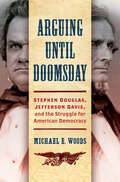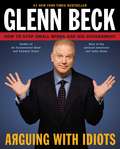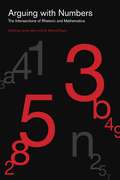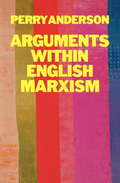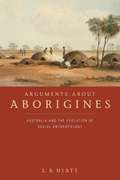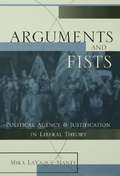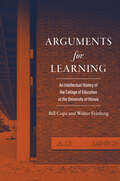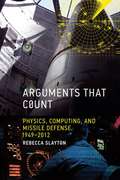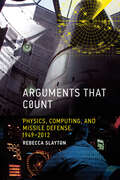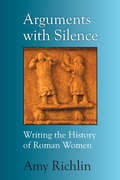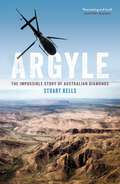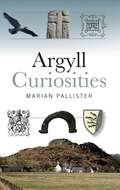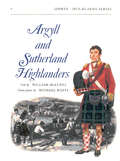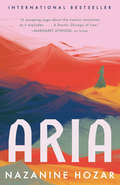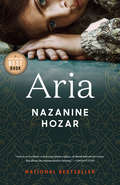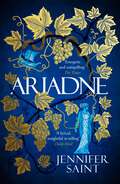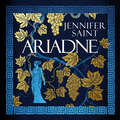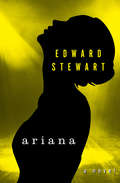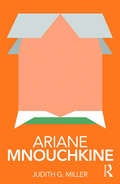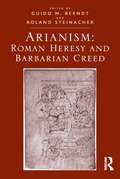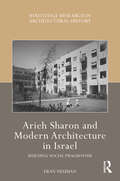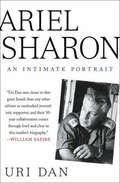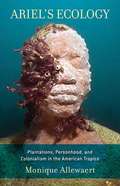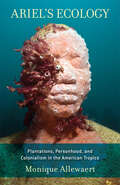- Table View
- List View
Arguing until Doomsday: Stephen Douglas, Jefferson Davis, and the Struggle for American Democracy (Civil War America)
by Michael E. WoodsAs the sectional crisis gripped the United States, the rancor increasingly spread to the halls of Congress. Preston Brooks's frenzied assault on Charles Sumner was perhaps the most notorious evidence of the dangerous divide between proslavery Democrats and the new antislavery Republican Party. But as disunion loomed, rifts within the majority Democratic Party were every bit as consequential. And nowhere was the fracture more apparent than in the raging debates between Illinois's Stephen Douglas and Mississippi's Jefferson Davis. As leaders of the Democrats' northern and southern factions before the Civil War, their passionate conflict of words and ideas has been overshadowed by their opposition to Abraham Lincoln. But here, weaving together biography and political history, Michael E. Woods restores Davis and Douglas's fatefully entwined lives and careers to the center of the Civil War era. Operating on personal, partisan, and national levels, Woods traces the deep roots of Democrats' internal strife, with fault lines drawn around fundamental questions of property rights and majority rule. Neither belief in white supremacy nor expansionist zeal could reconcile Douglas and Davis's factions as their constituents formed their own lines in the proverbial soil of westward expansion. The first major reinterpretation of the Democratic Party's internal schism in more than a generation, Arguing until Doomsday shows how two leading antebellum politicians ultimately shattered their party and hastened the coming of the Civil War.
Arguing with Idiots
by Glenn Beck Kevin BalfeFUNNY. FRIGHTENING. TRUE. The #1 New York Times bestseller that gives you the right answers when idiots leave you speechless! It happens to all of us: You're minding your own business, when some idiot* informs you that guns are evil, the Prius will save the planet, or the rich have to finally start paying their fair share of taxes. Just go away! you think to yourself--but they only get more obnoxious. Your heart rate quickens. You start to sweat. But never fear, for Glenn Beck has stumbled upon the secret formula to winning arguments against people with big mouths and small minds: knowing the facts. And this book is full of them. The next time your Idiot Friends tell you how gun control prevents gun violence, you'll tell them all about England's handgun ban (see page 53). When they insist that we should copy the UK's health-care system, you'll recount the horrifying facts you read on page 244. And the next time you hear how produce prices will skyrocket without illegal workers, you'll have the perfect rebuttal (from page 139). Armed with the ultimate weapon--the truth--you can now tolerate (and who knows, maybe even enjoy?) your encounters with idiots everywhere! *Idiots can't be identified through voting records; look instead for people who hide behind stereotypes, embrace partisanship, and believe that bumper sticker slogans are a substitute for common sense.
Arguing with Numbers: The Intersections of Rhetoric and Mathematics (RSA Series in Transdisciplinary Rhetoric #16)
by James Wynn G. Mitchell ReyesAs discrete fields of inquiry, rhetoric and mathematics have long been considered antithetical to each other. That is, if mathematics explains or describes the phenomena it studies with certainty, persuasion is not needed. This volume calls into question the view that mathematics is free of rhetoric. Through nine studies of the intersections between these two disciplines, Arguing with Numbers shows that mathematics is in fact deeply rhetorical. Using rhetoric as a lens to analyze mathematically based arguments in public policy, political and economic theory, and even literature, the essays in this volume reveal how mathematics influences the values and beliefs with which we assess the world and make decisions and how our worldviews influence the kinds of mathematical instruments we construct and accept. In addition, contributors examine how concepts of rhetoric—such as analogy and visuality—have been employed in mathematical and scientific reasoning, including in the theorems of mathematical physicists and the geometrical diagramming of natural scientists. Challenging academic orthodoxy, these scholars reject a math-equals-truth reduction in favor of a more constructivist theory of mathematics as dynamic, evolving, and powerfully persuasive. By bringing these disparate lines of inquiry into conversation with one another, Arguing with Numbers provides inspiration to students, established scholars, and anyone inside or outside rhetorical studies who might be interested in exploring the intersections between the two disciplines.In addition to the editors, the contributors to this volume are Catherine Chaput, Crystal Broch Colombini, Nathan Crick, Michael Dreher, Jeanne Fahnestock, Andrew C. Jones, Joseph Little, and Edward Schiappa.
Arguing with Numbers: The Intersections of Rhetoric and Mathematics (RSA Series in Transdisciplinary Rhetoric)
by James Wynn G. Mitchell ReyesAs discrete fields of inquiry, rhetoric and mathematics have long been considered antithetical to each other. That is, if mathematics explains or describes the phenomena it studies with certainty, persuasion is not needed. This volume calls into question the view that mathematics is free of rhetoric. Through nine studies of the intersections between these two disciplines, Arguing with Numbers shows that mathematics is in fact deeply rhetorical. Using rhetoric as a lens to analyze mathematically based arguments in public policy, political and economic theory, and even literature, the essays in this volume reveal how mathematics influences the values and beliefs with which we assess the world and make decisions and how our worldviews influence the kinds of mathematical instruments we construct and accept. In addition, contributors examine how concepts of rhetoric—such as analogy and visuality—have been employed in mathematical and scientific reasoning, including in the theorems of mathematical physicists and the geometrical diagramming of natural scientists. Challenging academic orthodoxy, these scholars reject a math-equals-truth reduction in favor of a more constructivist theory of mathematics as dynamic, evolving, and powerfully persuasive. By bringing these disparate lines of inquiry into conversation with one another, Arguing with Numbers provides inspiration to students, established scholars, and anyone inside or outside rhetorical studies who might be interested in exploring the intersections between the two disciplines.In addition to the editors, the contributors to this volume are Catherine Chaput, Crystal Broch Colombini, Nathan Crick, Michael Dreher, Jeanne Fahnestock, Andrew C. Jones, Joseph Little, and Edward Schiappa.
Arguments Within English Marxism
by Perry AndersonThe characteristic form taken by English Marxism since the war has been the study of history. No writer exemplifies its achievements better than Edward Thompson, whose Making of the English Working Class is probably the most influential single work of historical scholarship by a socialist today. An editor of The New Reasoner in 1957–59, a founder of the New Left in 1960, now an eloquent champion of civil rights, Thompson has most recently aroused widespread interest with the appearance of his Poverty of Theory, which combines philosophical and political polemic with Louis Althusser, and powerful advocacy of the historian's craft. Arguments Within English Marxism is an assessment of its central theses that relates them to Thompson's major historical writings themselves. Thus the role of human agency—the part of the conscious choice and active will—in history is discussed through consideration of its treatment in The Making of the English Working Class. The problems of base and superstructure in historical materialism, and of affiliation to values in the past, are reviewed in the light of Whigs and Hunters. The claims of utopian imagination are illustrated from the findings of William Morris. Questions of socialist strategy are broached in part through the articles now collected in Writing by Candlelight. Exploring at once differences and convergences between New Left Review and one of its founders, the essay concludes by suggesting the virtues of diversity within a common socialist culture.
Arguments about Aborigines: Australia and the Evolution of Social Anthropology
by L. R. HiattIn the nineteenth century, Australian Aborigines were used by European scholars as an exemplar of early human forms, and have consequently featured as the crucial case study for generations of social theorists and anthropologists. Arguments about Aborigines examines controversial subjects such as family life, religion and ritual, and land rights through the prism of Aboriginal studies. Professor Hiatt's book will provide a valuable introduction to Aboriginal ethnography, and is a shrewd and stimulating history of the central questions in Aboriginal studies.
Arguments and Fists: Political Agency and Justification in Liberal Theory
by Mika LaVaque MantyFirst published in 2002. Routledge is an imprint of Taylor & Francis, an informa company.
Arguments for Learning: An Intellectual History of the College of Education at the University of Illinois
by Bill Cope Walter FeinbergAlmost every educational idea worth a thought has been considered at the University of Illinois, and anything worth trying has been tested. In this history of ideas, Bill Cope and Walter Feinberg chronicle the intellectual lives of education thinkers at the university while tracking the development of educational ideas and practices in general. Cope and Feinberg draw on conversations, narratives, and archival research that reveal how different generations explored their role in defining and carrying out the College’s multifaceted mission. Their account raises critical questions about the character of learning, the aims of teaching, and the nature of teaching as a profession. At the same time, the authors address issues that range from the role of schools in fostering individual and collective identity to the introduction of computer-mediated and online learning. Cope and Feinberg examine changes in self-understanding about fundamental ideas and chart how the College evolved from its original narrow mission of training children’s schoolteachers to embracing global perspectives. A wide-ranging portrait of an institution, Arguments for Learning uses the School of Education to tell the stories of thinkers dedicated to the idea that education can change the world for the better.
Arguments that Count
by Rebecca SlaytonIn a rapidly changing world, we rely upon experts to assess the promise and risks of new technology. But how do these experts make sense of a highly uncertain future? In Arguments that Count, Rebecca Slayton offers an important new perspective. Drawing on new historical documents and interviews as well as perspectives in science and technology studies, she provides an original account of how scientists came to terms with the unprecedented threat of nuclear-armed intercontinental ballistic missiles (ICBMs). She compares how two different professional communities -- physicists and computer scientists -- constructed arguments about the risks of missile defense, and how these arguments changed over time. Slayton shows that our understanding of technological risks is shaped by disciplinary repertoires -- the codified knowledge and mathematical rules that experts use to frame new challenges. And, significantly, a new repertoire can bring long-neglected risks into clear view. <P> In the 1950s, scientists recognized that high-speed computers would be needed to cope with the unprecedented speed of ICBMs. But the nation's elite science advisors had no way to analyze the risks of computers so used physics to assess what they could: radar and missile performance. Only decades later, after establishing computing as a science, were advisors able to analyze authoritatively the risks associated with complex software -- most notably, the risk of a catastrophic failure. As we continue to confront new threats, including that of cyber attack, Slayton offers valuable insight into how different kinds of expertise can limit or expand our capacity to address novel technological risks.
Arguments that Count: Physics, Computing, and Missile Defense, 1949-2012 (Inside Technology)
by Rebecca SlaytonHow differing assessments of risk by physicists and computer scientists have influenced public debate over nuclear defense.In a rapidly changing world, we rely upon experts to assess the promise and risks of new technology. But how do these experts make sense of a highly uncertain future? In Arguments that Count, Rebecca Slayton offers an important new perspective. Drawing on new historical documents and interviews as well as perspectives in science and technology studies, she provides an original account of how scientists came to terms with the unprecedented threat of nuclear-armed intercontinental ballistic missiles (ICBMs). She compares how two different professional communities—physicists and computer scientists—constructed arguments about the risks of missile defense, and how these arguments changed over time. Slayton shows that our understanding of technological risks is shaped by disciplinary repertoires—the codified knowledge and mathematical rules that experts use to frame new challenges. And, significantly, a new repertoire can bring long-neglected risks into clear view.In the 1950s, scientists recognized that high-speed computers would be needed to cope with the unprecedented speed of ICBMs. But the nation's elite science advisors had no way to analyze the risks of computers so used physics to assess what they could: radar and missile performance. Only decades later, after establishing computing as a science, were advisors able to analyze authoritatively the risks associated with complex software—most notably, the risk of a catastrophic failure. As we continue to confront new threats, including that of cyber attack, Slayton offers valuable insight into how different kinds of expertise can limit or expand our capacity to address novel technological risks.
Arguments with Silence: Writing the History of Roman Women
by Amy RichlinWomen in ancient Rome challenge the historian. Widely represented in literature and art, they rarely speak for themselves. Amy Richlin, among the foremost pioneers in ancient studies, gives voice to these women through scholarship that scours sources from high art to gutter invective. In Arguments with Silence, Richlin presents a linked selection of her essays on Roman women's history, originally published between 1981 and 2001 as the field of "women in antiquity" took shape, and here substantially rewritten and updated. The new introduction to the volume lays out the historical methodologies these essays developed, places this process in its own historical setting, and reviews work on Roman women since 2001, along with persistent silences. Individual chapter introductions locate each piece in the social context of Second Wave feminism in Classics and the academy, explaining why each mattered as an intervention then and still does now. Inhabiting these pages are the women whose lives were shaped by great art, dirty jokes, slavery, and the definition of adultery as a wife's crime; Julia, Augustus' daughter, who died, as her daughter would, exiled to a desert island; women wearing makeup, safeguarding babies with amulets, practicing their religion at home and in public ceremonies; the satirist Sulpicia, flaunting her sexuality; and the praefica, leading the lament for the dead. Amy Richlin is one of a small handful of modern thinkers in a position to consider these questions, and this guided journey with her brings surprise, delight, and entertainment, as well as a fresh look at important questions.
Argyle: The Impossible Story of Australian Diamonds
by Stuart KellsThe remote Kimberley region of Western Australia has a rich history and unique geography. In the 1960s De Beers, the world's largest diamond company, sent gem-hunters to the area but they came away empty-handed. It was a vast region to survey, and they'd overlooked something vital. A few years later, a team of Australian geologists with a tiny budget searched for even tinier mineral clues. Those clues led them to the earth's largest diamond deposit and the world's richest source of rare pink diamonds. Based on in-depth research and interviews - including with Alan King Jones, Bill Leslie and 'the father of Australian diamonds', Ewen Tyler - Argyle: The Impossible Story of Australian Diamonds details the almost overwhelming challenges with realising a diamond mining venture in Australia, shows how these obstacles were overcome, and explores the mine's impact and legacy.
Argyll Curiosities
by Marian PallisterThe author of Lost Argyll offers an illustrated journey through the local lore and hidden histories of this curious county in the southwest of Scotland. The great travelers of the 17th century used the word &“curiosity&” in reference to many different things. The label was equally applied to people, plants, legends, historical facts and geological certainties. In Argyll Curiosities, Scottish author Marian Pallister follows their example in a 21st century journey around Argyll and its islands. It is difficult to find an area of Argyll which is not curious in some way: archaeology, geography, geology and genealogy have all revealed the uniqueness of this western fringe of Scotland. Going beyond the curiosities that are easily found on any journey through the county, Pallister has looked extensively into places, people and events which are curiously layered, resulting in a book that is overflowing with enchanting revelations and local histories.
Argyll and Sutherland Highlanders
by Michael Roffe William McelweeOn 1 July 1881 Viscount Cardwell's wholesale reorganisation of the British Army brought into existence Priness Louise's Argyll and Sutherland Highlanders. Both had existed as separate regiments even before their official incorporation into the British Army and on the face of it, this seemed a highly improbable union, Being separated both geographically and historically - they had never even served together in the same theatre. Yet, as history has shown, this unlikely combination proved to be a tremendous success. William McElwee tells the story of this most famous of regiments which has served with distinction in World War I (1914-1918), World War II (1939-1945), and beyond.
Aria: A Novel
by Nazanine HozarAn extraordinary, cinematic saga of rags-to-riches-to-revolution that follows an orphan girl coming of age in Iran at a time of dramatic upheaval It is the 1950s in a restless Iran, a country rich in oil but deeply divided by class and religion. The government is unpopular and corrupt and under foreign sway. One night, an illiterate army driver hears the pitiful cry of a baby abandoned in an alley and menaced by ravenous wild dogs. He snatches up the child and takes her home, naming her Aria—the first step on an unlikely path from deprivation to privilege. Over the next two decades, the orphan girl acquires three mother figures whose secrets she will learn only much later: reckless and self-absorbed Zahra, who abuses her; wealthy and compassionate Fereshteh, who adopts her; and mysterious Mehri, whose connection to Aria is both a blessing and a burden. A university education opens a new world to Aria, and she is soon caught up in the excitement and danger of the popular uprising against the Shah that sweeps through the streets of Tehran. The novel&’s heart-pounding, explosive finale sees the Ayatollah Khomeini&’s brutal regime seize power—even as Aria falls in love and becomes a mother herself. Nazanine Hozar&’s stunning debut gives us an unusually intimate view of a momentous time, through the eyes of a young woman coming to terms with the mysteries of her own past and future.
Aria: A Novel
by Nazanine HozarThis extraordinary, gripping debut is a rags-to-riches-to-revolution tale about an orphan girl's coming of age in Iran."Aria is a feminist odyssey, about a girl in a time of intolerance as the revolution in Iran is breaking out . . . a poised and dramatic historical novel with contemporary relevance." --John Irving"Here comes a sweeping saga about the Iranian revolution as it explodes--told from the ground level and the centre of chaos. A Doctor Zhivago of Iran." --Margaret Atwood (on Twitter)It is the early 1950s in a restless Iran, a country powerful with oil wealth but unsettled by class and religious divides and by a larger world hungry for its resources. One night, a humble driver in the Iranian army is walking home through a neighbourhood in Tehran when he hears a small, pitiful cry. Curious, he searches for the source, and to his horror comes upon a newborn baby girl abandoned by the side of the road and encircled by ravenous dogs. He snatches up the child, and forever alters his own destiny and that of the little girl, whom he names Aria.Nazanine Hozar's stunning debut takes us inside the Iranian revolution--but seen like never before, through the eyes of an orphan girl. Through Aria, we meet three very different women who are fated to mother the lost child: reckless and self-absorbed Zahra, wife of the kind-hearted soldier; wealthy and compassionate Fereshteh, who welcomes Aria into her home, adopting her as an heir; and finally, the mysterious, impoverished Mehri, whose connection to Aria is both a blessing and a burden. The novel's heart-pounding conclusion takes us through the brutal revolution that installs the Ayatollah Khomeini as Iran's supreme leader, even as Aria falls in love and becomes a young mother herself.
Ariadne: The Mesmerising Sunday Times Bestselling Retelling of Ancient Greek Myth
by Jennifer SaintA mesmerising retelling of the ancient Greek myth of Theseus and the Minotaur. Perfect for fans of CIRCE, A SONG OF ACHILLES, and THE SILENCE OF THE GIRLS.'ARIADNE gives voice to the misused Princess of Crete who betrayed her father to save Theseus from the Minotaur. Relevant and revelatory.' - StylistAs Princesses of Crete and daughters of the fearsome King Minos, Ariadne and her sister Phaedra grow up hearing the hoofbeats and bellows of the Minotaur echo from the Labyrinth beneath the palace. The Minotaur - Minos's greatest shame and Ariadne's brother - demands blood every year. When Theseus, Prince of Athens, arrives in Crete as a sacrifice to the beast, Ariadne falls in love with him. But helping Theseus kill the monster means betraying her family and country, and Ariadne knows only too well that in a world ruled by mercurial gods - drawing their attention can cost you everything. In a world where women are nothing more than the pawns of powerful men, will Ariadne's decision to betray Crete for Theseus ensure her happy ending? Or will she find herself sacrificed for her lover's ambition?ARIADNE gives a voice to the forgotten women of one of the most famous Greek myths, and speaks to their strength in the face of angry, petulant Gods. Beautifully written and completely immersive, this is an exceptional debut novel.Praise for Jennifer Saint and ARIADNE:'Exquisitely written and exceptionally moving, this is a mythical retelling to savour.' - Elodie Harper, author of THE WOLF DEN'With her wonderfully executed debut that reimagines the classic tale of Theseus, Adriane and the Minotaur, Jennifer Saint joins the likes of Madeline Miller and Pat Barker in forging mesmerising retellings of ancient Greek myths from a female perspective.' - Waterstones.com'Saint's immersive novel thrusts the reader straight into the heart of Greek mythology with this wonderful reimagining of the story of Ariadne.' - iPaper'What happens after the monster is defeated and the princess leaves with the hero? Jennifer Saint's ARIADNE is a shimmering tapestry of two sisters bound by deceit and the shadows of family history. . .With a fresh voice and keen insight, Saint adds flesh and bone to an ancient myth, drawing the reader into an uneasy world of ever-afters.' - Yangsze Choo, New York Times bestselling author of THE NIGHT TIGER
Ariadne: This summer discover the smash-hit mythical bestseller
by Jennifer Saint**The mesmerising retelling from the woman at the heart of one of Ancient Greece's most famous myths.**'I absolutely adored this book and am encouraging everyone I know to buy a copy.' ⭐ ⭐ ⭐ ⭐ ⭐ REAL READER REVIEW'The last few pages will easily become tear soaked. I loved every minute of this book' ⭐ ⭐ ⭐ ⭐ ⭐ REAL READER REVIEW'A lyrical, insightful re-telling' - Daily Mail'If you like Madeline Miller's Circe and Song of Achilles, you will eat up Ariadne [. . .] Saint makes it a page-turner' - Glamour'Exquisitely written and exceptionally moving, this is a mythical retelling to savour.' - Elodie Harper, author of THE WOLF DEN'ARIADNE gives voice to the misused Princess of Crete who betrayed her father to save Theseus from the Minotaur. Relevant and revelatory.' - StylistAriadne, Princess of Crete and daughter of the fearsome King Minos, grows up hearing stories of gods and heroes. But beneath the golden palace something else stirs, the hoofbeats and bellows echoing from the Labyrinth below. Every year its captive, the Minotaur - Ariadne's brother - demands blood.When Theseus, Prince of Athens, arrives as a sacrifice to the beast, Ariadne sees in him her chance to escape. But helping Theseus kill the monster means betraying her family and country, and Ariadne knows only too well that drawing the attention of the mercurial gods may cost her everything.In a world where women are nothing more than the pawns of powerful men, will Ariadne's decision to risk everything for love ensure her happy ending? Or will she find herself sacrificed for her lover's ambition?ARIADNE gives a voice to the forgotten women of one of the most famous Greek myths. Beautifully written and completely immersive, this exceptional debut novel is perfect for fans of CIRCE, A SONG OF ACHILLES, and THE SILENCE OF THE GIRLS.'With her wonderfully executed debut that reimagines the classic tale of Theseus, Adriane and the Minotaur, Jennifer Saint joins the likes of Madeline Miller and Pat Barker in forging mesmerising retellings of ancient Greek myths from a female perspective.' - Waterstones.com'Saint's immersive novel thrusts the reader straight into the heart of Greek mythology with this wonderful reimagining of the story of Ariadne.' - iPaper'What happens after the monster is defeated and the princess leaves with the hero? Jennifer Saint's ARIADNE is a shimmering tapestry of two sisters bound by deceit and the shadows of family history. . .With a fresh voice and keen insight, Saint adds flesh and bone to an ancient myth, drawing the reader into an uneasy world of ever-afters.' - Yangsze Choo, New York Times bestselling author of THE NIGHT TIGERWHAT THE READERS ARE SAYING...'Stunning writing, fabulous storytelling and surprisingly real characters who you could empathise with' ⭐ ⭐ ⭐ ⭐ ⭐'This is an essential book in the new and rising volume of retelling from the women's point of view - so revealing and questioning. The ending 5 pages of this book killed me.' ⭐ ⭐ ⭐ ⭐ ⭐'So real, so matter of fact, like a good chat on a girls' night out.' ⭐ ⭐ ⭐ ⭐ ⭐
Ariana: A Novel
by Edward StewartThe rarefied realm of opera comes alive in the story of a diva torn between passion and ambitionShe is Kavalaris—the most magnificent singer ever to grace the international operatic stage. Her talent is the stuff of legend and has made the men around her rich. Mark Rutherford first saw her when he was a young boy—and he cannot forget her. It will be almost two decades—separated by a depression and a world war—before they meet again and fall deeply in love.Beginning in 1928 and continuing for almost six decades, Ariana tells the story of a performer whose extraordinary gift touches everyone who hears her. But who is the woman behind the phenomenon? As Ariana bestows her gift on other singers, she ensures her immortality. It will come at a great cost to her own life. Because ambition—and the kind of success most people only dream of—always exacts a price.
Ariane Mnouchkine (Routledge Performance Practitioners)
by Judith MillerOver the last forty years, French director Ariane Mnouchkine and her theater collective, Le Théâtre du Soleil, have devised a form of research and creation that is both engaged with contemporary history and committed to reinvigorating theater by focusing on the actor. Now revised and reissued, this volume combines: ● an overview of Mnouchkine’s life, work and theatrical influences ● an exploration of her key ideas on theater and the creative process ● analysis of key productions, including her early and groundbreaking environmental political piece, 1789, and the later Asian-inspired play penned by Hélène Cixous, Drums on the Dam. ● practical exercises, including tips on mask work. As a first step toward critical understanding, and as an initial exploration before going on to further, primary research, Routledge Performance Practitioners offer unbeatable value for today’s student.
Arianism: Roman Heresy And Barbarian Creed
by Guido M. BerndtThis is the first volume to attempt a comprehensive overview of the evolution of the 'Arian' churches in the Roman world of Late Antiquity and their political importance in the late Roman kingdoms of the 5th-6th centuries, ruled by barbarian warrior elites. Bringing together researchers from the disciplines of theology, history and archaeology, and providing an extensive bibliography, it constitutes a breakthrough in a field largely neglected in historical studies. A polemical term coined by the Orthodox Church (the side that prevailed in the Trinitarian disputes of the 4th century C.E.) for its opponents in theology as well as in ecclesiastical politics, Arianism has often been seen as too complicated to understand outside the group of theological specialists dealing with it and has therefore sometimes been ignored in historical studies. The studies here offer an introduction to the subject, grounded in the historical context, then examine the adoption of Arian Christianity among the Gothic contingents of the Roman army, and its subsequent diffusion in the barbarian kingdoms of the late Roman world.
Arieh Sharon and Modern Architecture in Israel: Building Social Pragmatism (Routledge Research in Architectural History)
by Eran NeumanArieh Sharon and Modern Architecture in Israel: Building Social Pragmatism offers the first comprehensive survey of the work of Arieh Sharon and analyzes and discusses his designs and plans in relation to the emergence of the State of Israel. A graduate of the Bauhaus, Sharon worked for a few years at the office of Hannes Mayer before returning to Mandatory Palestine. There, he established his office which was occupied in its first years in planning kibbutzim and residential buildings in Tel Aviv. After the establishment of the State of Israel in 1948, Arieh Sharon became the director and chief architect of the National Planning Department, where he was asked to devise the young country’s first national masterplan. Known as the Sharon Plan, it was instrumental in shaping the development of the new nation. During the 1950s and 1960s, Sharon designed many of Israel’s institutions, including hospitals and buildings on university campuses. This book presents Sharon’s exceptionally wide range of work and examines his perception of architecture in both socialist and pragmatist terms. It also explores Sharon’s modernist approach to architecture and his subsequent shift to Brutalist architecture, when he partnered with Benjamin Idelson in the 1950s and when his son, Eldar Sharon, joined the office in 1964. Thus, the book contributes a missing chapter in the historiography of Israeli architecture in particular and of modern architecture overall. This book will be of interest to researchers in architecture, modern architecture, Israel studies, Middle Eastern studies and migration of knowledge.
Ariel Sharon
by Uri DanIn 1954 reporter Uri Dan met a young military commander named Ariel Sharon and followed him closely for more than half a century. Dan became Sharon's trusted advisor and a witness to the defining moments of the Israeli-Palestinian conflict--from secret meetings with heads of state to open warfare in the Sinai. This riveting combination of political history, narrative biography, interviews, and correspondence sheds new light on the conflict in the Middle East and provides an intimate, definitive portrait of Ariel Sharon--a man whose life is inextricably intertwined with Israel's destiny. With Hamas governing Palestine, Ariel Sharon gravely ill and the party he founded, the Kadima, in control of the Knesset, this book couldn't be more timely.
Ariel's Ecology: Plantations, Personhood, and Colonialism in the American Tropics
by Monique AllewaertWhat happens if we abandon the assumption that a person is a discrete, world-making agent who acts on and creates place? This, Monique Allewaert contends, is precisely what occurred on eighteenth-century American plantations, where labor practices and ecological particularities threatened the literal and conceptual boundaries that separated persons from the natural world. Integrating political philosophy and ecocriticism with literary analysis, Ariel's Ecology explores the forms of personhood that developed out of New World plantations, from Georgia and Florida through Jamaica to Haiti and extending into colonial metropoles such as Philadelphia. Allewaert's examination of the writings of naturalists, novelists, and poets; the oral stories of Africans in the diaspora; and Afro-American fetish artifacts shows that persons in American plantation spaces were pulled into a web of environmental stresses, ranging from humidity to the demand for sugar. This in turn gave rise to modes of personhood explicitly attuned to human beings' interrelation with nonhuman forces in a process we might call ecological. Certainly the possibility that colonial life revokes human agency haunts works from Shakespeare's Tempest and Montesquieu's Spirit of the Laws to Spivak's theories of subalternity. In Allewaert's interpretation, the transformation of colonial subjectivity into ecological personhood is not a nightmare; it is, rather, a mode of existence until now only glimmering in Che Guevara's dictum that postcolonial resistance is synonymous with "perfect knowledge of the ground. "
Ariel's Ecology: Plantations, Personhood, and Colonialism in the American Tropics
by Monique AllewaertWhat happens if we abandon the assumption that a person is a discrete, world-making agent who acts on and creates place? This, Monique Allewaert contends, is precisely what occurred on eighteenth-century American plantations, where labor practices and ecological particularities threatened the literal and conceptual boundaries that separated persons from the natural world.Integrating political philosophy and ecocriticism with literary analysis, Ariel&’s Ecology explores the forms of personhood that developed out of New World plantations, from Georgia and Florida through Jamaica to Haiti and extending into colonial metropoles such as Philadelphia. Allewaert&’s examination of the writings of naturalists, novelists, and poets; the oral stories of Africans in the diaspora; and Afro-American fetish artifacts shows that persons in American plantation spaces were pulled into a web of environmental stresses, ranging from humidity to the demand for sugar. This in turn gave rise to modes of personhood explicitly attuned to human beings&’ interrelation with nonhuman forces in a process we might call ecological.Certainly the possibility that colonial life revokes human agency haunts works from Shakespeare&’s Tempest and Montesquieu&’s Spirit of the Laws to Spivak&’s theories of subalternity. In Allewaert&’s interpretation, the transformation of colonial subjectivity into ecological personhood is not a nightmare; it is, rather, a mode of existence until now only glimmering in Che Guevara&’s dictum that postcolonial resistance is synonymous with &“perfect knowledge of the ground.&”
